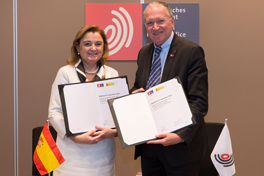

THE President of the European Patent Office is the source of many of today's problems; the many scandals that are purely his own fault make the USPTO look like a saint and it doesn't help when Benoît Battistelli speaks about his pet chinchilla García-Escudero in his blog, reinforcing the perception of nepotism and protectionism under his reign.
epo.org link), to be promoted in this couple of tweets after EPOPIC, twice on Friday morning/noon [1, 2]. Mind the part which isn't just self-promotional and EPO promotion/hogwash but speaks specifically about García-Escudero, namely:
The latest of the international agreements is, fittingly, a new bilateral cooperation plan signed with Ms Patricia García-Escudero, Director General of the Spanish Patent and Trademark Office, which will also include projects in the field of patent information and awareness between the EPO and SPTO.
Is it at all possible for the Council to force the President to do anything?
As recent history has shown several times this year, when the Council gives instructions to the President, the President simply ignores them and does as he wishes. In the present case, the Council explicitly asked the President to refrain from dismissals, we see what the President did. I gather that Merpel's proposal to use Article 20 PPI would have the same effect.
What can the Council do?
Correct me if I am wrong, I am not a specialist of the EPC. I understand from Article 11.1 of the EPC that the Council can nominate a new President. But first, I am not really sure they can do so before the end of his term (can they or not?) and second, they need a majority of 3/4 of the votes for doing so (Article 35). There are 38 member states, so the votes of 28 are needed. Conversely, if Battistelli gets the votes or the abstentions of 10 countries, he can stay forever. Any 10 countries.
Is there anything else that the Council can do?
There is Article 19 of the PPI: the Council can waive the immunity of the President. This has never been tried and I have no idea how many votes would be necessary. Even the Article is not clear as the German, English and French texts are actually different (English: "waive immunity", German and French "waive one of the immunities"). Besides, this would be very slow.
There is Article 11.4 EPC: the Council shall exercise disciplinary authority over the President. Apparently, only a simple majority is needed under Article 35.1 in that case, so 19 countries. But this has never been tried and I don't know under which conditions that "disciplinary authority" can be exercised or what sanctions they can impose on the President, whether the President can appeal (which would add delays), etc... Can they actually dismiss him? That seems to be in contradiction with the number of votes needed to elect a new President. Can they impeach him? If yes, he would then be automatically replaced by one of the vice-presidents (Article 10.3 EPC), which may not be very useful if that vice-president is Minnoye, Topic, etc...
Last, there is Article 172: the Convention can be revised (for example to include more checks and balances to the President powers). Here again, 3/4 of the votes are necessary.
Did I forget something?
Well the EU doesn't like dissent and so it will be interesting to see how this pans out. The EPO doesn't have the power or inclination to take on the EU and so will presumably need to look for a way to reverse the G decision. Perhaps there needs to be a mechanism for the EPO to refer questions to the CJEU as a way of preventing this happening again.
Did I forget something?
Yes. You forgot Article 4a. Call a ministerial conference to discuss the situation. It is long overdue. Supposed to be held once every five years. But so far none held.
Also there is no problem with them opening disciplinary proceedings against the President. The disciplinary committee would then issue an opinion and the Admin Council would then vote on this opinion. Of course it's not going to happen. The ship will sail on. Just like the Titanic.
@Article 4a: the article calls for a meeting on IP matters, not a conference... All the UPC meetings can be counted under Art. 4aEPC...
Article 4a[ 4 ] Conference of ministers of the Contracting States Art. 4 A conference of ministers of the Contracting States responsible for patent matters shall meet at least every five years to discuss issues pertaining to the Organisation and to the European patent system.
All the UPC meetings can be counted under Art. 4aEPC.
What do you mean by "UPC meetings"?
The Unitary Patent is an agreement of certain member states (28 EU states) under Article 142 EPC. http://www.epo.org/law-practice/legal-texts/html/epc/2016/e/ar142.html
Article 4a foresees a conference of the ministers of all 38 contracting states.
There is no requirement that all EPC members need to be present, just a conference on patent matters and/or the organisation....
28 out of 38 is even a majority.....